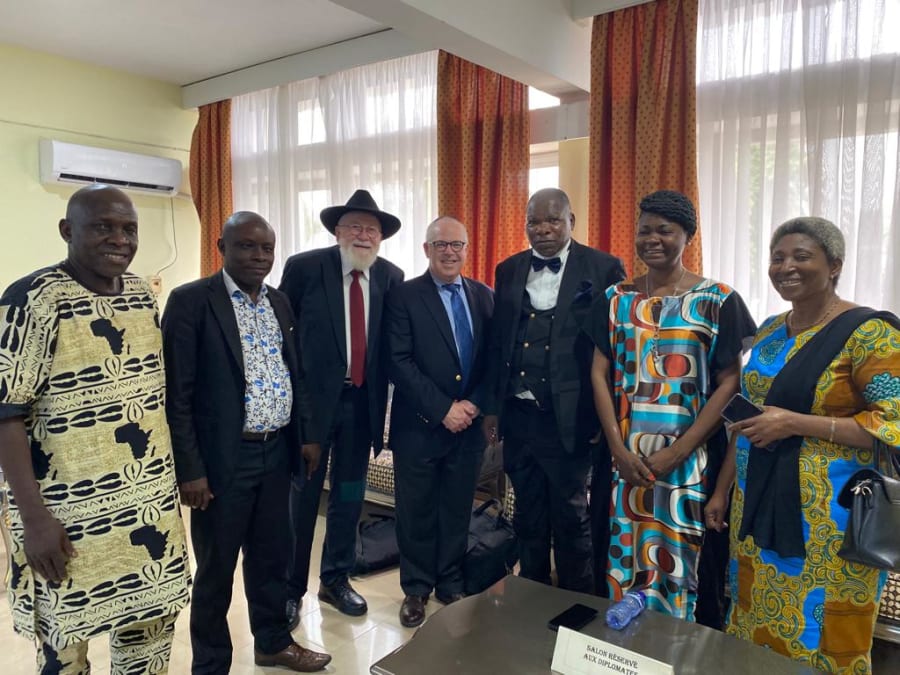Africans love Israel, but not all their governments do

Last week, when I returned home to Israel from my first trip to Africa, the continent was hijacked by the irrational evil of anti-Israel hostility as Israel’s representative was expelled from an opening session of the African Union. Algeria and South Africa served as the bookend bullies behind this treacherous and obscenely undiplomatic move. Until today, the best-known hijacking in Africa related to Israel and the Jewish people was the Libyan and Ugandan orchestrated hostage taking in Entebbe in 1976.
What I discovered in Kinshasa, Democratic Republic of Congo, and through a virtual prayer meeting with scores of participants from about one third of the African Union (AU) members, is an unbreakable love and support for Israel and the Jewish people. This is sincere and displayed in many ways, from selling Israeli flags on the street to major churches having Israeli flags next to the Congolese flag at the front of their church.
When I visited churches I was received with warmth and enthusiastic applause, repeatedly, and had a deeply emotional experience at one church when its thousands of members sang HaTikvah, Israel’s national anthem, in French. Walking openly as an Orthodox Jew everywhere I went, complete strangers approached me countless times, saying “shalom,” expressing their love for Israel and asking to take a selfie together.
While this level of love for Israel may be unique in Congo as a Christian country whose president is one of the greatest pro-Israel Christian heads of state in the world today, it is, nevertheless, widespread throughout Africa. The day before I flew home, the depth and sincerity of prayers for Israel on the continent-wide Zoom event was inspiring. We prayed for a positive outcome for Israel as the AU was convening in Ethiopia and a certain amount of pushback to Israel’s presence was expected. With the sincerity of love for Israel and the depth of the prayers, nobody imagined that we needed to specifically pray that Israel’s representative would not be expelled from the opening session.
Africans know that the history of Israel and the Jewish people in their continent runs deep. From biblical figures, such as Abraham, Joseph, Jacob, Moses, and King Solomon, Africans know that our history is linked, and chronicled in the Bible. As a newly-independent state shaking off the colonialism of the British Mandate, Israel identified with and provided vast support for the other newly-independent states of Africa, emerging from French, British, Portuguese and Italian colonization.
While most day-to-day life and business in Congo is conducted in French, in the church services I attended, there was simultaneous translation into Lingala, one of the many indigenous languages which, along with Swahili and others, demonstrate part of Africa’s true (pre-colonial) cultural heritage. Africans also relate to Israel on that level, not just as a slightly older fellow (reborn) independent state, but one in which the people’s indigenous language has been revived. The fact that the language in Israel is also the language of the Bible emphasizes that the Jewish people are at home in the Land of Israel, the original Bible belt.
Africans also know that since its rebirth, Israel has been a good friend and neighbor. From Theodor Herzl expressing support for Africa as a pillar of early Zionism, to Golda Meir as foreign minister putting action behind that. Golda traveled throughout Africa to make friends and provide support to newly-independent African nations that were struggling to absorb hundreds of thousands of new immigrants (many from northern Africa), fighting for their very survival and building infrastructure to make the land blossom. This was neither presumed nor to be taken for granted.
One hundred and twenty years ago, under British colonial rule, seeking a solution for Jewish aspirations for their own state, Britain proposed establishing that in Uganda. We did not become next-door neighbors then, but we have been good neighbors and friends.
After the 1967 Six-Day War, Africa played a role in the erosion of relationships in which Israel had sincerely invested. In Khartoum, Sudan (one of the most recent Arab and African states to make peace and establish full relations with Israel), the Arab League issued their response to Israel’s overtures for peace, “the three No’s.” They would not make peace with Israel, nor recognize or make negotiations with it. After the 1973 Yom Kippur War, the Arab League made a full court press against any African nations maintaining relations with Israel. Most bowed to Arab pressure and severed their important ties with Israel, despite going against their own interests.
Over the decades, many Arab states restored their relations with Israel. With a reparation of ties, they were able to reset the calendar to welcome Israel to invest in their countries and their prosperity, not rape them and take out valuable minerals, diamonds and more, as others do.
Many of the Africans I've met believe a core biblical principle is at play, that God blesses those who bless Israel, and curses those who curse Israel. They believe their nations have been cursed as a result of turning their back on Israel, and deeply want to bless Israel, not just because it’s to their advantage, but because it’s biblical.
More recently, Israel has established relations with Chad, Morocco and Sudan, three additional significant African nations. Despite most African nations wanting meaningful and mutually beneficial relations with Israel, and the model of Egypt – where Jewish people were enslaved and where Israel fought multiple wars – making peace with Israel more than four decades ago, there are still recalcitrant and evil holdouts.
Nigeria is the most populous nation in Africa, with about as many Christians as Congo has citizens. But also as many Muslims who are less prone to support Israel. They straddle an awkward line under the leadership of a Muslim president, partly embracing open relations with Israel and partly shunning it.
Perhaps nothing better should be expected of Algeria. Yet in recent decades, South Africa’s self-destructive and dishonest foreign policy has made it a leader in anti-Israel and even anti-Semitic lies. South Africa, of all nations, knows better. South Africans know that Israel is not an apartheid state and that nothing in Israel even comes close to the discriminatory and hateful former South African policy of complete racial segregation and subjugation.
By expelling Israel’s representative from the AU assembly, Africa has been hijacked, virtually colonized by an ideology that is not only evil, but against the interests and well-being of the entire continent.
Africans know better. It’s just a matter of time before they take back their continent. I pray it will be soon, for them and for us.

Jonathan Feldstein was born and educated in the U.S. and immigrated to Israel in 2004. He is married and the father of six. Throughout his life and career, he has become a respected bridge between Jews and Christians and serves as president of the Genesis 123 Foundation. He writes regularly on major Christian websites about Israel and shares experiences of living as an Orthodox Jew in Israel. He is host of the popular Inspiration from Zion podcast. He can be reached at [email protected].













